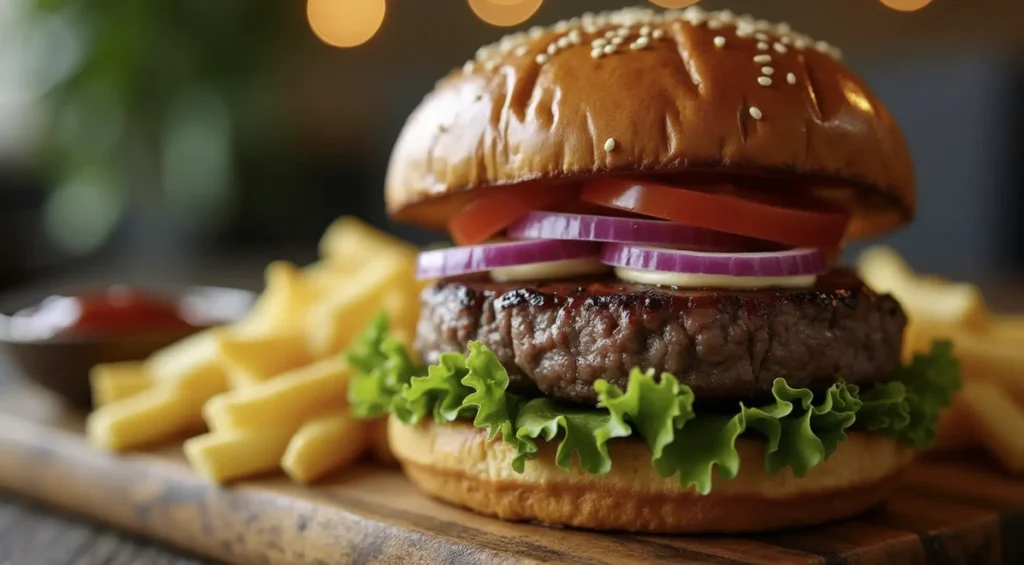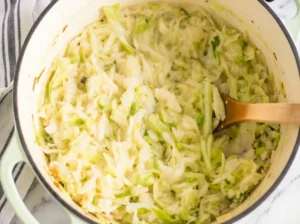Wagyu burgers are a true culinary delight, often described as the epitome of luxury in the burger world. Known for their buttery texture, rich flavor, and premium quality, they have earned a special place in the hearts of food enthusiasts worldwide. However, for those following Islamic dietary laws, an important question arises: Is a Wagyu burger halal? The answer isn’t always straightforward, as it depends on several factors including the source of the beef and its processing methods.
This guide will take you on a journey to understand what makes Wagyu beef so exceptional, explain the key principles of halal certification, and provide insights into identifying halal Wagyu burgers. Additionally, we’ll explore creative recipe ideas, answer commonly asked questions, and uncover why Wagyu burgers stand out from traditional beef burgers. If you’re ready to elevate your dining experience while staying halal-conscious, read on to discover everything you need to know about Wagyu burgers.
What Is a Wagyu Burger Made Of?
At its core, a Wagyu burger is made from the meat of Wagyu cattle, a breed originating in Japan that is prized for its exceptional quality. The word “Wagyu” itself translates to “Japanese cow.” These cattle are raised under meticulous conditions, with a focus on their diet and overall care to ensure the meat achieves its legendary status.
The patties used in Wagyu burgers are typically crafted from ground Wagyu beef, which boasts a uniquely rich marbling—thin streaks of fat dispersed throughout the muscle tissue. This marbling isn’t just for appearance; it significantly enhances the flavor, creating a melt-in-your-mouth texture that’s unrivaled in the world of burgers.
Wagyu burgers are often seasoned sparingly with simple ingredients like salt and pepper to allow the natural flavors of the beef to shine. That said, the halal status of Wagyu burgers hinges on whether the meat adheres to Islamic guidelines. Is a Wagyu burger halal? This depends on factors such as how the cattle were raised, the slaughtering process, and whether halal certification is provided.
If you’re curious about other halal-friendly recipes, consider trying these leftover rotisserie chicken recipes to add variety to your meals while staying within halal boundaries.
Why Wagyu Beef Is Unique

Above all, Wagyu beef is famous for its remarkable marbling. This natural, intramuscular fat appears as thin, web-like streaks that weave through the meat, giving it an unparalleled texture and flavor profile. When cooked, the marbled fat melts into the meat, resulting in a burger that’s exceptionally juicy and tender. This is why Wagyu beef is often hailed as the gold standard in the culinary world.
Wagyu beef is also graded based on several factors, including marbling, color, firmness, and fat quality. Higher grades, such as A5 (the highest grade for Japanese Wagyu), feature more marbling and are considered a true luxury. Because of this, Wagyu beef tends to command premium prices, both at fine-dining establishments and specialty butcher shops.
Moreover, Wagyu burgers are often kept simple in their preparation to highlight the meat’s natural richness. But while the unique qualities of Wagyu beef are undeniable, the question remains: Is a Wagyu burger halal? Not all Wagyu beef automatically meets halal standards. Ensuring that the meat is halal requires careful attention to the slaughtering process, the avoidance of cross-contamination, and proper certification.
Additionally, halal-conscious consumers can elevate their Wagyu dining experience by pairing their burger with halal-friendly sides like steak and mashed potatoes. The result is a satisfying meal that perfectly balances indulgence with dietary compliance.
Is A Wagyu burger halal?: What Makes Meat Halal?
Understanding what makes meat halal is essential for answering the question, “Is a Wagyu burger halal?” The term “halal” refers to anything that is permissible under Islamic law, including food. For meat to qualify as halal, it must adhere to strict guidelines that prioritize humane treatment, ethical slaughtering, and cleanliness throughout the entire process.
First and foremost, the animal must be slaughtered by a Muslim who recites the name of Allah at the time of slaughter. This invocation is a key part of the process, ensuring that the act is carried out in accordance with Islamic principles. Additionally, the animal must be treated with respect and care during its life, reflecting the emphasis Islam places on humane treatment.
Another crucial aspect of halal meat is the avoidance of any cross-contamination with non-halal foods. For instance, the meat must not come into contact with substances considered impermissible under Islamic law. Furthermore, the processing facility must meet high standards of cleanliness to ensure the meat remains halal from start to finish.
Finally, halal meat is often certified by reputable organizations to provide assurance to consumers. If you’re wondering whether a Wagyu burger meets these requirements, look for halal certification labels or inquire about the source of the beef. In short, a Wagyu burger can be halal if the beef complies with these detailed guidelines.
Understanding these principles not only helps you make informed choices but also deepens your appreciation for the care and ethics that go into halal food preparation.
Is All Wagyu Beef Halal?
The straightforward answer is no—not all Wagyu beef is halal. While Wagyu beef is derived from cattle, its halal status depends on various factors such as how the cattle are raised, slaughtered, and processed. The distinction lies in whether the meat adheres to the principles of Islamic dietary laws. Many consumers assume that all beef is halal, but this is not the case. To confidently answer the question, “Is a Wagyu burger halal?”, it’s important to examine specific conditions that influence halal certification.
Factors Influencing Halal Certification
- Slaughtering Practices: For Wagyu beef to be considered halal, the animal must be slaughtered according to Islamic guidelines. This involves a Muslim reciting the name of Allah (Bismillah) during the process and ensuring the blood is fully drained from the animal. This practice is critical for halal compliance.
- Processing Standards: After slaughter, the beef must be processed in a facility that strictly avoids cross-contamination with non-halal products. Processing halal meat requires adherence to stringent standards, and any lapse could render the meat non-halal.
- Certification Labels: Finally, the most reliable way to confirm that Wagyu beef is halal is to check for reputable halal certification. Look for certifications from trusted organizations like the Halal Monitoring Authority (HMA) or Halal Food Authority (HFA). These certifications ensure the meat has been prepared in compliance with Islamic dietary laws.
In contrast, Wagyu beef that lacks halal certification may not meet these requirements. Because of this, it’s crucial to verify the source before purchasing or consuming Wagyu products. Ensuring the beef is halal-certified allows consumers to enjoy their meal with confidence and peace of mind.
Is A Wagyu burger halal? How to Identify Halal Wagyu Burgers

Determining whether a Wagyu burger is halal might seem overwhelming at first. However, by following a few simple steps, you can easily ensure that your burger aligns with halal dietary standards. When asking, “Is a Wagyu burger halal?”, it’s all about verifying the source and certification of the meat.
1. Look for Halal Certification
One of the easiest ways to identify halal Wagyu burgers is by checking for halal certification. Halal-certified Wagyu beef will always display a recognizable label from a trusted Islamic organization. Certifications from reputable bodies, such as the Halal Monitoring Authority (HMA) or Halal Food Authority (HFA), guarantee that the meat has been slaughtered, processed, and packaged according to Islamic guidelines. These labels provide assurance and peace of mind to consumers.
2. Research the Supplier
Beyond checking for certification, researching the supplier is essential. Not only does this ensure credibility, but it also gives insight into the production process. Trusted suppliers like Snake River Farms and Grand Western Steaks are known for offering high-quality Wagyu beef, including halal-certified options. Always confirm with the supplier whether their products are halal to avoid any confusion.
3. Ask Questions When Dining Out
When eating at a restaurant, don’t hesitate to ask the staff about the source of their Wagyu beef. Inquire whether it is halal-certified and whether the kitchen adheres to halal preparation standards. Asking these questions ensures that the Wagyu burger you’re about to enjoy complies with Islamic dietary laws.
4. Watch for Cross-Contamination
Finally, ensure that halal Wagyu meat hasn’t been exposed to non-halal substances during preparation. For example, shared grills, utensils, or cutting boards used for non-halal meat can compromise the halal status. It’s important to confirm that the kitchen is halal-compliant and avoids cross-contamination.
By taking these steps, you can confidently answer the question, “Is a Wagyu burger halal?”, and enjoy this luxurious treat while adhering to your dietary requirements.
Creative Variations of Halal Wagyu Burgers

Once you’ve sourced halal-certified Wagyu beef, you can transform it into a variety of mouthwatering burger creations. From classic recipes to gourmet twists, the possibilities are endless. So, is a Wagyu burger halal? It certainly can be, and here are some creative ways to make it even more enjoyable.
1. Classic Halal Wagyu Burger
- Ingredients: Halal Wagyu beef patty, fresh lettuce, tomato slices, red onion rings, halal mayonnaise, and a toasted brioche bun.
- Instructions: Start by seasoning the halal Wagyu patty with a pinch of salt and pepper. Grill it to your desired level of doneness. Next, lightly toast the brioche bun for added texture. Assemble the burger by layering the fresh lettuce, tomato, and onion onto the bun, followed by the juicy Wagyu patty. Finish with a dollop of halal mayonnaise for a simple yet satisfying meal.
2. Spicy Jalapeño Wagyu Burger
- Ingredients: Halal Wagyu beef, fresh jalapeño slices, spicy harissa sauce, melted pepper jack cheese, and a sesame seed bun.
- Instructions: Season and grill the halal Wagyu patty until it’s perfectly juicy. In the last minute of grilling, add a slice of pepper jack cheese to melt over the patty. Toast the sesame seed bun and spread a layer of harissa sauce on the bottom. Add the patty, followed by fresh jalapeño slices for a fiery twist. Pair this burger with a comforting side of steak and mashed potatoes for a hearty, halal-friendly meal.
3. Gourmet Mushroom and Swiss Wagyu Burger
- Ingredients: Sautéed mushrooms, Swiss cheese, caramelized onions, arugula, and truffle aioli.
- Instructions: Begin by sautéing mushrooms with a touch of olive oil and garlic until golden brown. Grill the halal Wagyu patty and melt a slice of Swiss cheese over it. Toast a gourmet bun, such as a ciabatta roll, and spread truffle aioli on both sides. Layer the patty with caramelized onions, mushrooms, and fresh arugula for a luxurious burger experience.
These creative variations are perfect for any occasion, allowing you to enjoy the rich, buttery flavor of Wagyu beef while staying true to halal guidelines. With halal-certified Wagyu beef, you can confidently answer the question, “Is a Wagyu burger halal?”, and create a meal that’s as ethical as it is delicious.
Why Is Wagyu Hamburger So Expensive?
Wagyu hamburgers are a luxury item, and their high price reflects the effort and care required to produce them. Is a Wagyu burger halal? The answer depends on its source, but understanding its cost begins with knowing what makes Wagyu beef unique.
- Selective Breeding: Wagyu cattle are raised with specialized care to achieve maximum marbling and tenderness, which requires high-quality feed and optimal living conditions.
- Limited Supply: Authentic Japanese Wagyu is rare and subject to strict export controls, increasing its exclusivity and cost.
- Premium Quality: The exceptional flavor, rich marbling, and melt-in-your-mouth texture set Wagyu apart, justifying its premium price.
While Wagyu hamburgers may be expensive, their superior taste and texture make them a worthwhile indulgence. For halal consumers, halal-certified Wagyu offers the same indulgence with peace of mind.
Benefits of Choosing Halal Wagyu Burgers
Opting for halal Wagyu burgers ensures a meal that satisfies both your palate and your values. Is a Wagyu burger halal? When certified, it comes with several benefits:
- Peace of Mind: Halal-certified Wagyu follows Islamic guidelines, ensuring your meal aligns with your dietary beliefs.
- Ethical Standards: Halal practices emphasize humane treatment of animals and ethical slaughter.
- Superior Taste: Halal Wagyu still delivers the signature richness, marbling, and tenderness of this premium beef.
Choosing halal-certified Wagyu means indulging in a luxurious burger experience without compromising on quality or ethics.
Is Wagyu Better Than a Normal Beef Burger?
In short, yes! Is a Wagyu burger halal? When certified, it’s not only halal but also superior in every way.
- Flavor: Wagyu’s marbling creates a richer, more buttery taste.
- Texture: The high-fat content gives it a tender, melt-in-your-mouth quality.
- Quality: Wagyu cattle are raised with exceptional care, ensuring top-tier beef.
While regular burgers can be delicious, they can’t match the luxurious appeal of Wagyu. Halal-certified Wagyu takes this indulgence to the next level.
FAQs: Is A Wagyu burger halal?
What is a Wagyu burger made of?
A Wagyu burger is made from ground Wagyu beef, renowned for its rich marbling and buttery texture.
Is Wagyu better than a normal beef burger?
Yes, Wagyu burgers are superior due to their intense flavor, tender texture, and high-quality production.
Why is Wagyu hamburger so expensive?
The high cost of Wagyu hamburgers is due to specialized breeding, limited supply, and exceptional quality.
Where can I find halal Wagyu burgers?
Look for halal-certified suppliers or restaurants that specialize in halal Wagyu beef.
What are some halal Wagyu burger toppings?
Toppings like caramelized onions, truffle aioli, spicy harissa, and fresh veggies pair wonderfully with halal Wagyu burgers.
Check Out the Official Wagyu Burger Recipe!
Want to create the ultimate Wagyu burger at home? This step-by-step recipe will guide you through crafting the perfect burger, from selecting premium Wagyu beef to choosing gourmet toppings like truffle aioli or caramelized onions. With tips on preparation and cooking, you’ll achieve a restaurant-quality burger right in your kitchen.
Whether you prefer a classic Wagyu cheeseburger or a loaded masterpiece, this guide ensures a juicy, flavorful burger every time. Perfect for any occasion, this recipe celebrates the rich taste and tenderness of Wagyu beef.
📖 Get the Recipe Here: Wagyu Burger Recipe
Don’t wait—explore the full recipe now and elevate your burger game with this luxurious creation!


